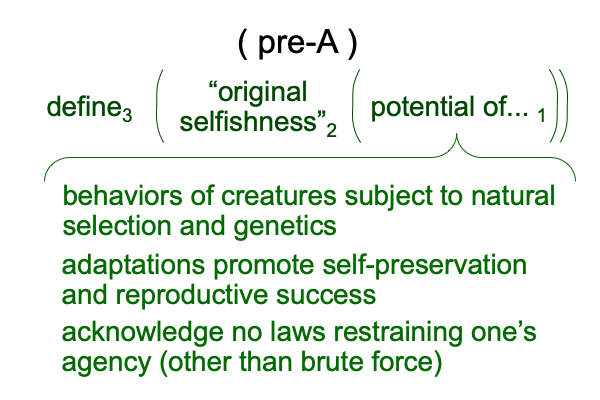0017 If “selfishness” is a noun with a scientific affiliation, then what about Domning’s titular adjective, “original”?
What is “original selfishness”?
0018 To Domning, “original” means “evolved”.
“Original selfishness” is an adaptation into (what I will call) the niche of natural selection and genetics. This niche is more complicated than my quick-and-dirty labeling. See Comments on Dennis Venema and Scot McKnight’s Book (2017) Adam and the Genome. (Search for Razie Mah and this title. It is available in smashwords and other e-book venues.)
This niche operates since the origin of multicellular eukaryotic life on Earth.
The adaptations promote self-preservation and reproductive success.
Here is a definition.

0019 Of course, “original selfishness” locates Adam as the earliest microscopic creature, perhaps the first eukaryote, appearing hundreds of millions of years ago.
On one hand, this association may seem to be a disadvantage to Domning’s association of original selfishness to original sin.
On the other hand, Domning’s association accounts for the universality of original sin, as well as its moral reality.
Yes, that is the claim.
0020 These deficits and benefits are wrestled with in chapter 10, in a paragraph starting with, “in regards to concupiscence”. Our disordered selfish desires act out our original selfishness. So, the moral character (the acting out of a disorder) is distinct from the universality of selfishness (as an evolved trait, an adaptation into the niche of natural selection and genetics). The former calls for grace and salvation. The latter is what Christ transcends.
In sum, Domning separates the source of original sin’s universality (which, traditionally is descent from Adam, but now, Adam is a microorganism at the base of the tree of life) and its moral character (which is tied to human free will, and, to me, is the noun that “selfish” applies to).
